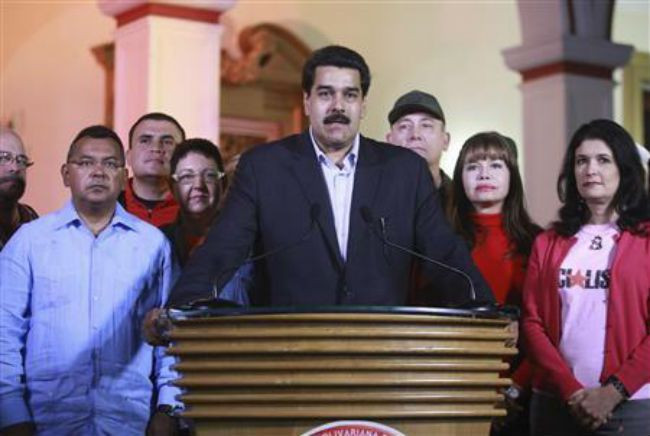
Venezuelans waited anxiously on Wednesday for more details of President Hugo Chavez's condition in Cuba after cancer surgery deemed successful by the government but still shrouded in secrecy.
Supporters held prayer vigils around the South American nation, while opponents also wished the 58-year-old socialist leader best wishes for a successful recovery.
"We ask God ... to bless Commander Chavez so that he gets better each day and we have the pleasure of seeing him home sooner rather than later," said Vice President Nicolas Maduro, whom Chavez has named as a potential successor should he be incapacitated.
The stakes are enormous - not just for leadership of a nation with the world's largest oil reserves but also for allies around Latin America and the Caribbean who rely on Chavez's generous oil subsidies and other aid.
President Raul Castro's communist government in Cuba is particularly vulnerable because of its dependence on more than 100,000 barrels of oil per day from Venezuela.
After 14 years of acrimony with the bombastic Chavez, Washington is watching the situation closely, too.
POSSIBLE SUCCESSION
Venezuela's government said Tuesday's six-hour operation - Chavez's fourth in Havana since mid-2011 for a recurring cancer in the pelvic region - had concluded "correctly and successfully."
No medical details were released, leaving Venezuelans again guessing about what type of cancer Chavez was suffering, and if all malignant tissues had been completely removed.
Opposition leaders criticized the government for lack of transparency, comparing the handling of Chavez's cancer with the detailed doctors' reports made public during other Latin American leaders' bouts with the disease in recent years.
Chavez changed the panorama before flying to Cuba by naming Maduro as his preferred replacement and urging Venezuelans to vote for him should an election be triggered by his departure from office.
Maduro, who is also foreign minister, is handling the day-to-day leadership of government, while other senior figures such as Congress head Diosdado Cabello and Energy Minister Rafael Ramirez are with Chavez in Havana.
Chavez's aim is to be home and well enough for the scheduled January 10 start of his new six-year term but there has been no word on when he might be able to fly back to Caracas.
"We continue praying for this post-operation phase, where he must continue overcoming difficulties. May God give him strength," priest Walter Nabea said in a Caracas square where Chavez supporters have been gathering in solidarity.
CAPRILES' FIGHT
The Chavez health saga has eclipsed the buildup to regional elections on Sunday that will be an important test of political forces in Venezuela at such a pivotal moment.
Of most interest in the 23 state elections is opposition leader Henrique Capriles' bid to retain the Miranda governorship against a challenge from former vice president Elias Jaua.
Polls have been mixed with one showing Capriles way ahead and another giving Jaua a 5 percentage point lead.
Capriles must win if he is to retain credibility and be the opposition's presidential candidate-in-waiting should Chavez's cancer force a new election. Even though it may be premature, many Venezuelans already are asking themselves what a Capriles versus Maduro presidential election would be like.
Though he lost to Chavez in the October presidential poll, the Capriles performed creditably after a year of crisscrossing the nation to make himself known to Venezuelans.
Capriles, who favors a Brazilian-style government promoting open markets with firm welfare safeguards, won 44 percent in the election, a record 6.5 million votes for the opposition.
Although past polls have shown Capriles more popular than all of Chavez's allies, that would not necessarily be the case against a Maduro candidacy imbued with Chavez's personal blessing and with the power of the Socialist Party behind him.
"Capriles is probably the only potential opposition candidate with sufficient national presence, name recognition and organization to defeat a sympathy-buoyed Nicolas Maduro in a short campaign," Credit Suisse said in one of numerous Wall Street research notes on Venezuela's intriguing political scene.
"However, if he were to lose a second election in under three months, there could be greater uncertainty about who would be the opposition's candidate if new elections were held."
Beyond the Miranda battle, plenty of other senior politicians are enmeshed in interesting duels.
On the opposition side, Zulia Governor Pablo Perez and Lara Governor Henri Falcon - both seen as possible opposition presidential candidates should Capriles' momentum falter - are fighting to retain their positions.
In the government camp, Chavez's brother Adan is seeking re-election in the family's home state of Barinas, in Venezuela's agricultural heartland, while various former ministers have been sent out into the provinces to contest governorships.
Chavez's cancer has deprived his candidates of his personal support on the campaign trail but analysts say that could be offset by a sympathy factor that will benefit them.
© Thomson Reuters.




